My Year of Living Under Constant Attack in Kyiv
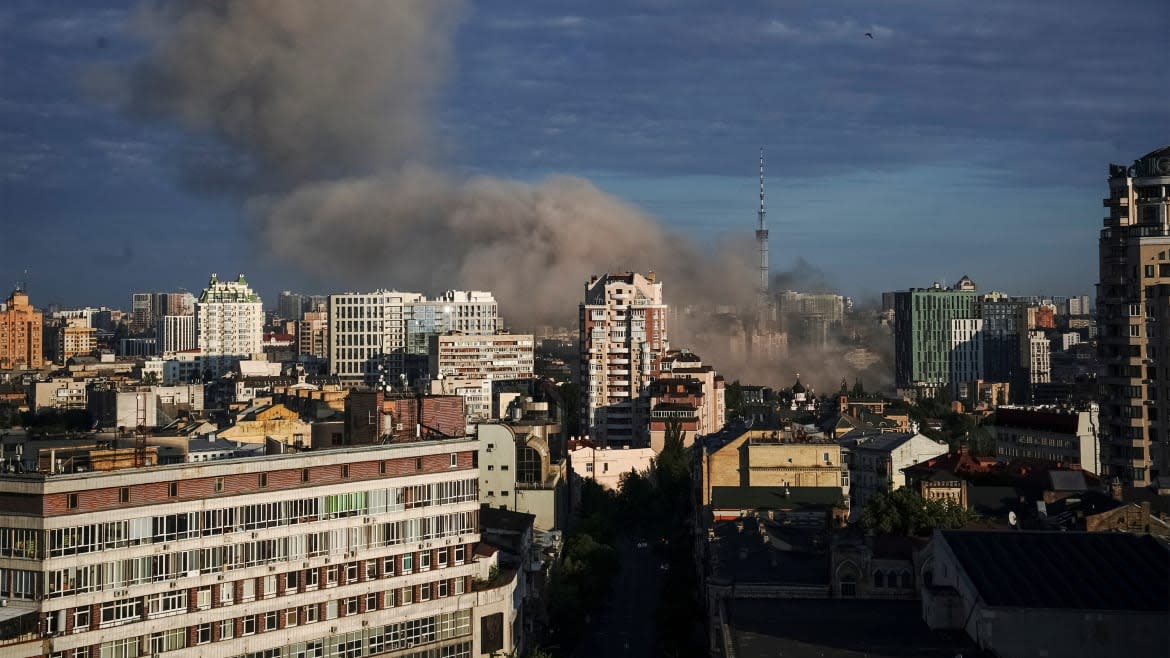
At 5 a.m. on February 24, 2022, my husband woke me up in our Kyiv apartment. He had heard explosions.
In complete darkness, I tried to dress and pack documents, a laptop, and cash into a backpack. Immediately I started experiencing nausea, diarrhea, and pain in the bottom of my stomach. My period began three weeks earlier than it normally would (something that also happened to many Ukrainian women with whom I’ve spoken). And I also had COVID.
10 Surprising Lessons of the Ukraine War So Far
We went to our relatives’ place, as they had a basement.
On February 10, 2023, we were still in Kyiv, and I was once again ill with COVID. Russia continues to attack my country with missiles from jets and a frigate in the Black Sea, so I hear air raids almost constantly. But this morning, my husband woke me up and said, “Morning bombardments again, so we are going out to eat waffles.”
Our emergency backpacks—containing vital documents, cash, tactical first aid kit, knife, protein bars, coffee beans in chocolate, torch, lighters, warm socks, gloves, and a laptop with a power source—are always near our front door. This morning, we picked them up, and walked out—to a waffle cafe, located in a basement, with a sign on the door reading, “We Do Not Work During Massive Shellings!!!”
It’s been one year since Russia escalated its war on Ukraine to one of nationwide, full-scale military aggression. The act of going out for waffles is one way we try—despite living under mortal threats and enduring the collapse of the lives we once lived—to recreate what was once a normal world. These old routines don’t feel the same, though they are valuable as they give us the fleeting comfort of feeling we can control at least this one little thing.
Great danger forces you to appreciate basic things. Small stories make up big landscapes, like going out for waffles during airstrikes. Here are some reflections on living my life during wartime.
Scotch Tape as a Lifesaver
It’s February 2022, I’m at home, and the frost stings my skin. We keep our windows open to hear Russian missiles as soon as possible.
My parents are coming to visit, and I’ve asked them to bring just one thing—scotch tape. All over the city and throughout the country, people scotch-tape their windows. It is supposed to protect you from fragments of glass shattered by the blast wave.
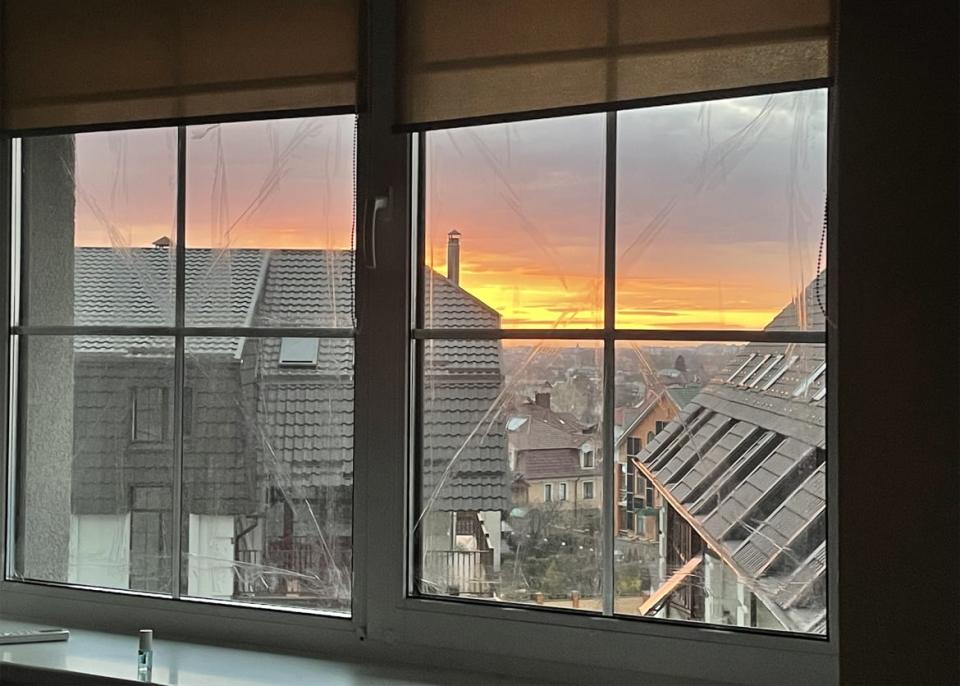
Scotch tape on the windows.
Is it actually effective? I don't know. As civilians, we’re learning as we go. We’re scotch-taping everything, including (in a sense), our relationships with other people.
My husband's younger brother, a veteran who lost his leg at the front line of Russia’s war against Ukraine in 2015, joined the air-assault brigade. They needed walkie-talkies. My cousin and his friends joined the territorial defense forces. Their battalion needed 20 bulletproof vests and 20 helmets. A family friend, an ordinary warehouse worker, became a tank commander and went to Donetsk. Their unit needed first aid kits, clothes, and tourniquets.
It was clear to me that I had only one option—get the stuff for them. And yet, I didn’t have any idea how. Where would I get the money? How do I manage the new bank regulations—which include transaction limits and a ban on purchasing items from abroad? How do I handle deliveries given the long queues at the border and fuel shortages? Every warehouse in the country is empty, because everyone’s looking to get the same things for their loved ones.
As we already stick to invisible and thin things—like tape—to protect ourselves, we also naturally rely on our networks. Acquaintances of friends, colleagues, students, a yoga teacher, and a family doctor played a crucial role in helping me help the people on the front lines. We managed everything via chats.
To buy NATO-standard wound and trauma bandages from Norway to deliver them to Bakhmut, as well as vests from China delivered to Irpin, and uniforms from Bordeaux sent to Kharkiv, we built networks—informal, decentralized, adaptive, formed around the task, helping us fend off the physical exhaustion of trying to do it alone.
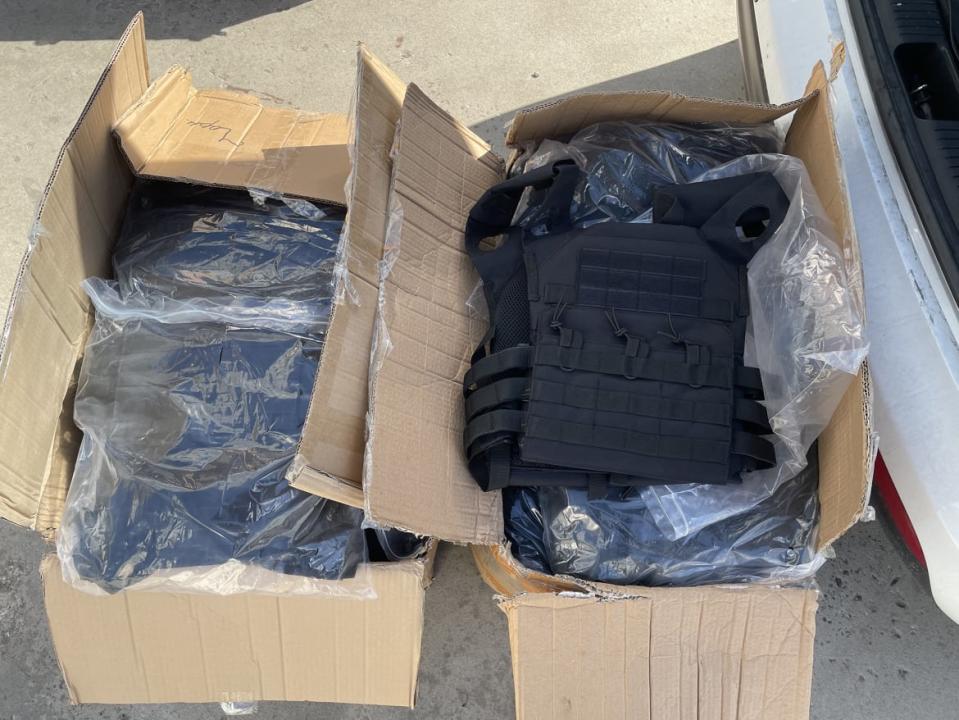
Boxes of plate carriers.
We managed everything via chats. Usually, the chats went silent at 2 a.m., but since 4 a.m., as if on a freaking schedule, the Russians resumed their attacks and bombardments. This forced us to go the basement, which was cold as hell, and it was impossible to sleep in. For months, we experienced extreme sleep deprivation. On top of that, the Russians were producing media content of all kinds, telling us that the next influx of Russian army units would cut us all down. This was how I learned that such basic things as sleep deprivation and fear were some of Russia’s most devastating weapons used on Ukrainian civilians.
But our solidarity persisted, and we were able to secure and deliver all these boxes with medications and means of personal protection. We bought “virtual” tickets to the Mykolaiv Zoo, to provide funds to keep the animals fed. And we continued to pay our electricity bills, even though it was unclear whether we would even have a home tomorrow. That's how we created our reality.
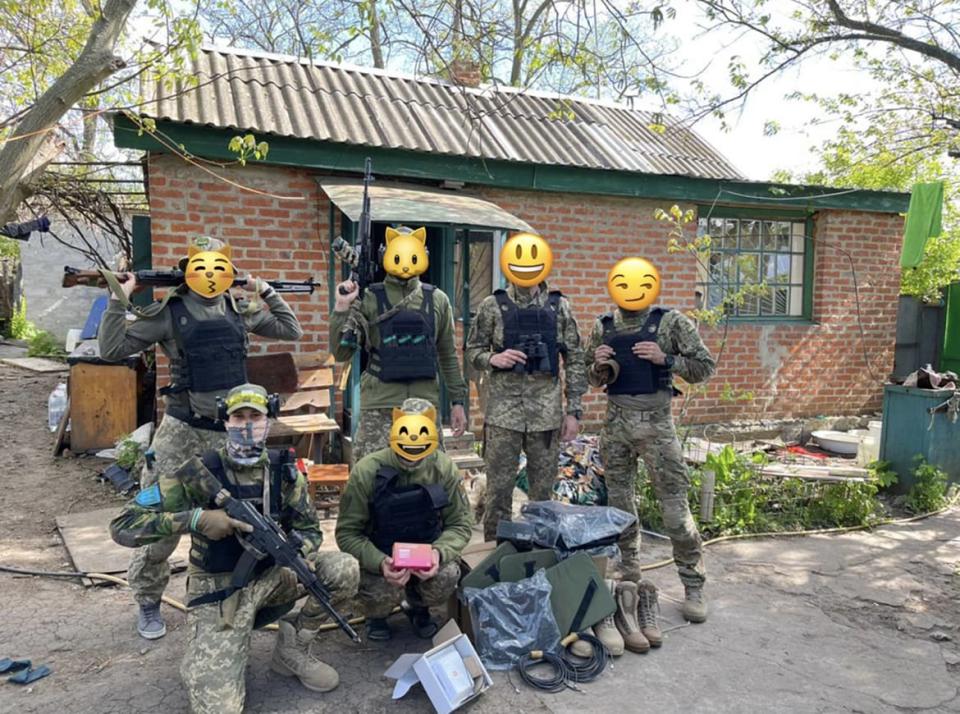
Vests, boots and antennas delivered to Ukrainian soldiers.
Better Self-Regulation Has Joined the Chat
Before long, my husband and I were receiving hundreds of messages every day, providing lists of platforms and contacts where certain items could be procured, and other forms of help could be found. This afforded us about four hours per day to figure out how we could reinvent our workflows, needs, and motivation to proceed with the work of teaching, researching, and writing.
Air raid alerts weren’t just blared on sirens, they were also delivered via mobile apps, which allowed you to choose a melody. My warning to watch for falling shells and missiles comes in the form of a traditional Ukrainian song played at festive gatherings to invite guests to the table. However, instead of the classic words, “Dear guests, dear family, we invite you to find your table,” I hear, “Dear guests, dear family, we invite you to find your bomb shelter.” It’s surreal, like everything else, but it makes me stress a bit less.
At any given point in the day—even answering emails or going to the kitchen to grab a snack—you might next see a missile hitting an apartment building across the street. At a certain point, a tragedy becomes a routine. You have no choice but to keep functioning.
One way we do that is by incorporating the resistance into our routines.
Among other efforts, we have the “daily donations rule,” where we send five to 10 dollars a day to support the army through small initiatives put together by our friends or to funds we trust). We also raise funds ourselves, take freelance work so that we can donate more to the cause, and volunteer our physical labor where we can be helpful. Work, donate, and volunteer—it’s a mantra. And it never feels like enough, as our fellow Ukrainians die every single day.
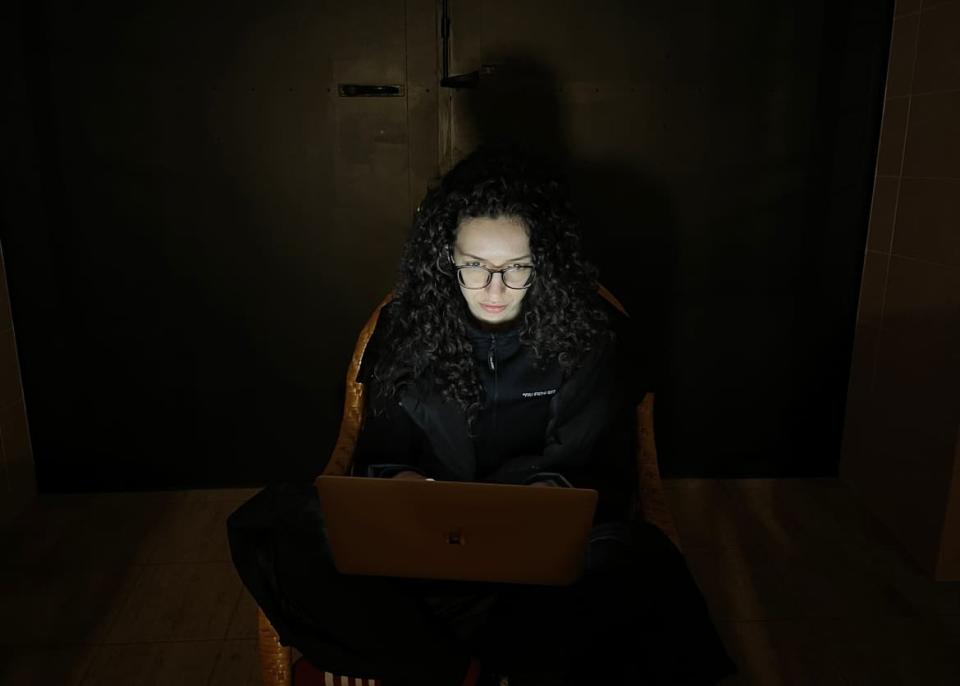
Working from a basement on March 8, 2022.
My friends and I regularly hold small fundraisers to support our friends and relatives on the front line, and manage the logistics of deliveries. Sometimes, when reading or watching official reports of certain operations, I’ve thought: “Oh, these are the guys for whom we bought helmets! Oh, I know the model of the washing machine we sent to those guys!”
I won’t say it hasn’t been hard to work without days off and weekends, but all this self-regulation and grassroots initiative represents a moving power. We do not wait. We improve our current reality on the scale we were able to.
But the Russians adapted as well. Sleep deprivation and fear have already been used as a weapon—cold, darkness, absence of water, and deprivation of means of communication came next.
All I Need For a Bright Future Is a Power Generator
It’s late October 2022, and another massive attack of Russian drones has just ended. I returned from the bomb shelter—where we now have benches, blankets, yoga mats, water, and Wi-Fi—and fell asleep. I woke up in a cold apartment and discovered there was no signal on my phone, the Wi-Fi was not working, and there was no electricity or water. We listened to the news and heard about the total blackout in the country via an old radio on batteries. My husband and I left our home to explore the city, hoping to catch a mobile signal in another district and find a coffee shop powered by a Starlink.
No matter what, coffee is always outstanding in Kyiv. The owner of one of the first Viennese coffee houses, the creator of the Viennese coffee recipe which popularized the drink in Europe, was Yurii-Frants Kulchytskyi, a Ukrainian nobleman of Cossack origin. And even during the worst days of the war, the coffee shops were working. Still, unsure if any of us would live another day, baristas often said something like, “Oh, come on, it’s our treat, you’ll pay tomorrow.”
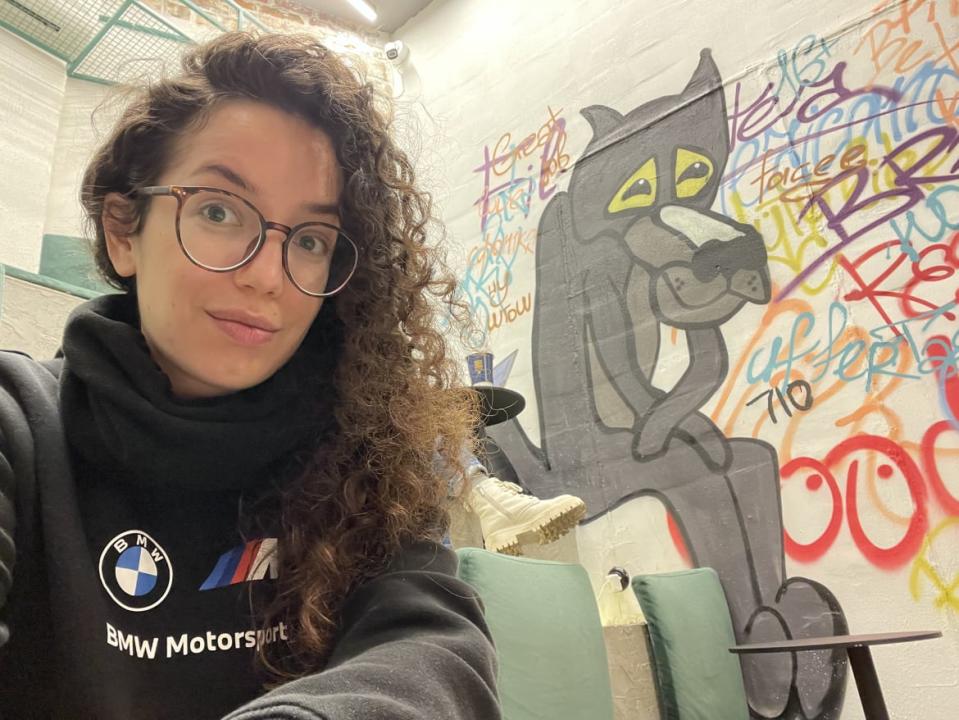
Mariia Shuvalova in a blackout cafe with lights and internet.
I got a fantastic cappuccino, a stupid fortune cookie which said, “We'll die anyway,” and was mesmerized by what I saw: dozens of people speaking different languages and holding Zoom calls; two officers with rifles waiting for big lattes to go; a soldier having his English lesson. Everyone was so calm and focused on what they were doing. Remember, this was in the immediate aftermath of a Russian onslaught, which helped me believe we’d get through this phase of the war, as well.
Before long, the whole city became our home.
You could sit at tables and chairs in the supermarket, you could use a hair dryer at the post office, you could hold a lecture at a gas station, catch mobile internet in the subway, and withdraw cash at the pharmacy. Special places for work (with internet and electricity) appeared even in the pretrial detention center of Kyiv. I rented a non-fixed spot in the common corridor of the co-working space. I held work meetings in the closet, where there were many coats, but a lot of quiet.
Then, a Russian missile partially destroyed the co-working space, and I stopped going there.
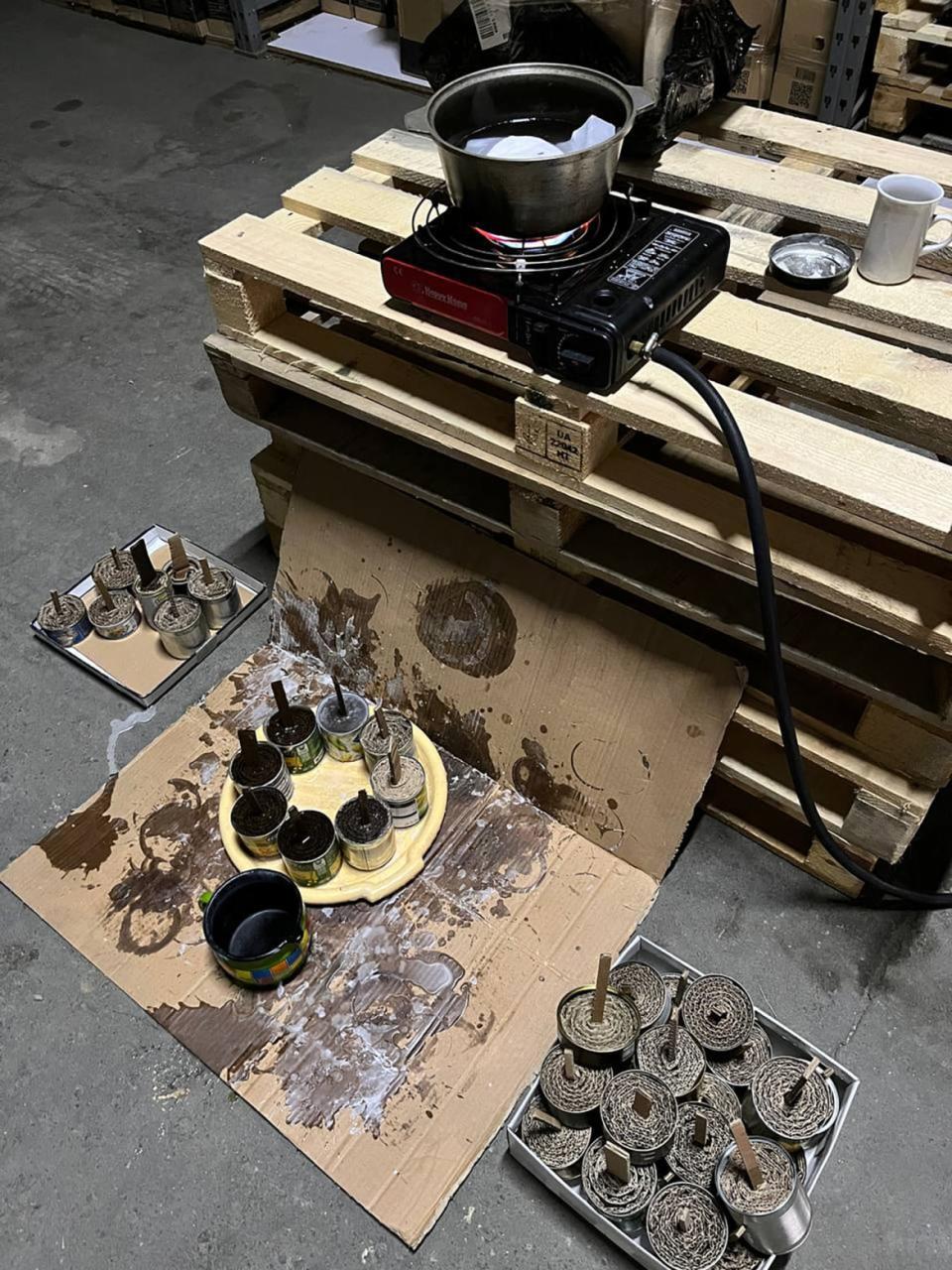
Crafting trench candles.
Sometimes life resembles a cyberpunk future—a Russian drone flies through a city with no electricity, a pickup truck appears, and someone on the truck finds a drone with a searchlight and hits it with anti-aircraft twin-barreled autocannon. Sometimes life resembles World War I—we cut cardboard and make trench candles in the warehouse. Both technology and cold trenches with mud are an integral part of this war.
Sometimes life resembles being held hostage by a psychopath. The military has its own internet and communications, so the Russians engage in psychological terrorism against civilians.
A number of posters and messages calling on Ukrainians to protest against the government were distributed in social networks and chat rooms by Russian agents in disguise.
One message read: “Our illegitimate government started this bloody war, so now we don’t even have light in our homes. But we should have at least a little bit of courage, go to the streets, and overthrow the government. Friendly Russia will support us then and give us the electricity.”
It's completely sick, but it can also be perversely fun.
One Russian poster (clearly using Google Translate to write in Ukrainian) made two comical mistakes. They used the Russian words (moch'—strength, muki—sufferings) that can be translated to Ukrainian in two different ways. The phrase, “There is no strength to endure this hellish suffering” was translated as “There is no urine to endure this hellish flour.”
It made us laugh so much, it became an idiom. Now if we’re pissed off by something bizarre and stupid, we say, “I have no urine to endure this hellish flour.”
Today, Kyiv’s air quality is terrible and its streets smell slightly of gasoline, but that also means we hear the buzzing of generators—we have adapted and continue to work. And we’ll see what we face tomorrow.
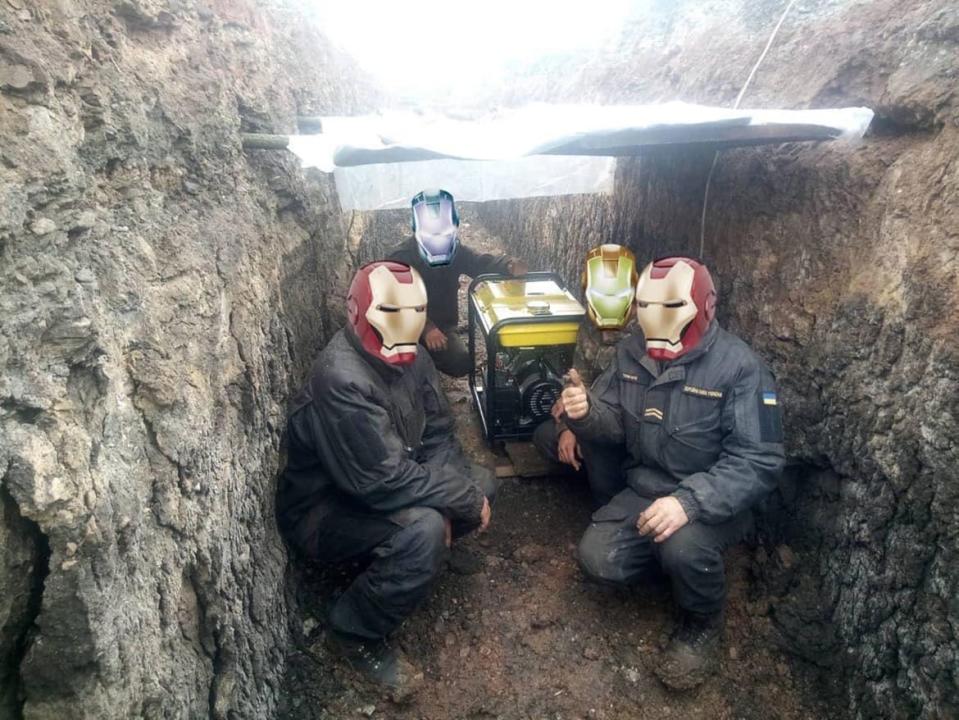
A power generator delivered to a tank brigade.
Invisible Things That Are Always With Us
My grandparents were workaholic small farmers, and I don’t mean that in a good way.
Three of four of them died because, rather than rehabilitating from serious maladies like strokes and hemorrhages, they went back to the arduous physical labor of farming. But I now understand where this stamina came from—they were born during the Holodomor of 1932-33, a man-made famine designed by Stalin’s Kremlin to destroy the Ukrainian peasantry, the Ukrainian intellectual and cultural elites, and the hope of Ukrainian independence from the Soviet Union.
For decades, my grandparents were forced to provide free labor for the Soviets. They could not freely speak their language, could not baptize their children, could not have a monetary reward for their work, and could not keep all that was grown on their land near the house. But independence dramatically changed everything for my family. An uncle started a business, and all of my mom’s nine siblings became employed and stopped living on the breadline.
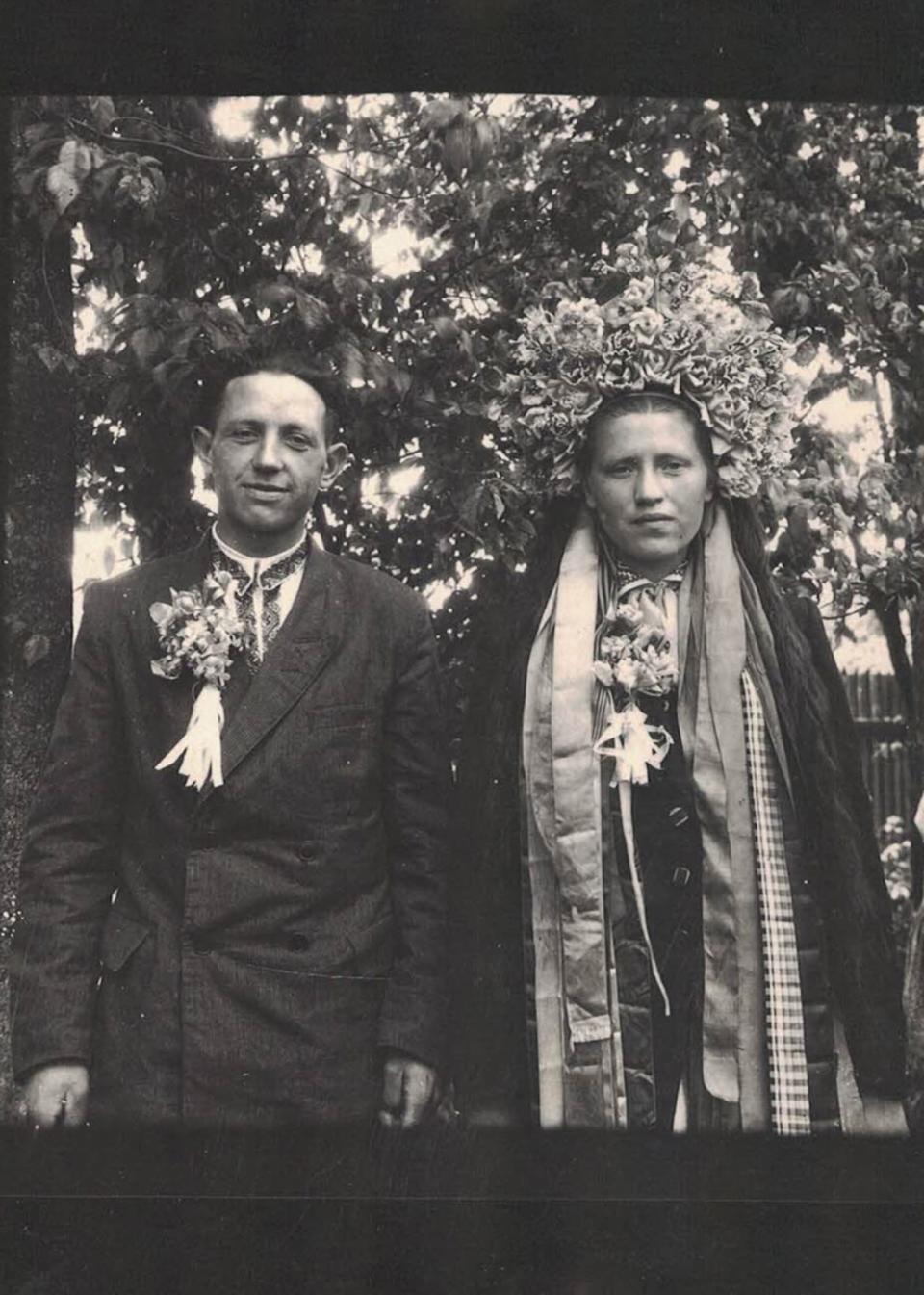
The author's grandparents.
By the time I was in the fifth grade, my family was economically middle class, allowing us to move from the province to Kyiv for greater opportunities, including my sister and I learning other languages and getting a quality education—a huge privilege, a previously unheard-of possibility for our family. My sister was accepted at Paris Art Academy. I became a Fulbright scholar and conducted research at Columbia University in New York, before returning home in 2020.
My sister and I belonged to the first generation of Ukrainians born in an independent Ukraine and not affected by Russian terror. But that all changed in 2014. Once again, as Ukrainians we endure war, face the threat of extermination, and witness the denial and destruction of cultural heritage by the ancient enemy—the idea of Russian supremacy.
Ukraine Official Reveals Goal of Suspected Russian Balloons
Too much of the world is ignorant to the 300 years of imperialism and crimes of the Russian Empire, the Soviet Union, and now, the Russian Federation. These were inflicted not only on Ukraine, but Eastern Europe and the Caucasus, as well.
And while the Russias can use that same technology to create fakes and propaganda, this is also a war for authenticity—for speaking your own language in your own home, not being shamed for who you are, for being heard and understood.
Authenticity is a thing that can’t be donated, received as aid, or found through a coffee shop’s internet connection. For me, staying in Ukraine means the commitment to be myself, however much discomfort it brings.
The most ambitious dream in my life is the most humble one—feeling safe, while being my truest self. Meanwhile, invisible and adhesive things hold our reality together.
Get the Daily Beast's biggest scoops and scandals delivered right to your inbox. Sign up now.
Stay informed and gain unlimited access to the Daily Beast's unmatched reporting. Subscribe now.

